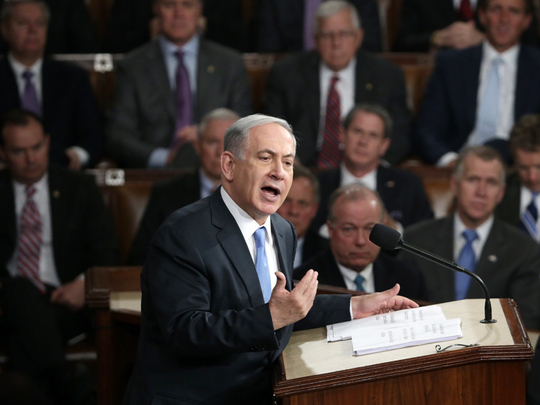
Despite high tensions between Israeli Prime minister Benjamin Netanyahu and United States President Barack Obama, there are no major indicators to assume that the Israel and America’s“special relationship” is in danger. Netanyahu’s arrogant takeover of the US Congress last Tuesday to give an election speech was just that, and it is unlikely to change US’s approach to Israel.
In the lead up to Netanyahu’s controversial joint address, questions were being raised in western media. These centred around the speech itself against the backdrop of an impending Israeli general election and the fact that the speech was taking place without Obama’s prior knowledge. Democrats boycotting the speech appeared on various political talk shows to reiterate that Obama, not the Republicans or Congress for that matter, was the sole authority when it comes to US foreign policy. Some went further and discussed Iran, which Netanyahu focused on, to warn that it is the Democrats who are promoting diplomacy having drawn lessons from the catastrophic 2003 US-led invasion of Iraq, courtesy of the Republican camp. Republicans decided to put their common interest with Israel of ensuring that Iran doesn’t get a nuclear deal ahead of their country’s overall interests and at the risk of insulting their own president — which is not that surprising. A recent Gallup Poll showed that while 83 per cent of Americans who identify as Republicans supported Israel in its conflict with the Palestinians, only 48 per cent of Democrats expressed the same sentiment, down from 58 per cent last year. Moreover, Republicans have led a very public campaign to try to undermine Obama’s presidency be it on domestic issues or foreign policy.
On the other hand, Obama’s national security adviser Susan E. Rice said in a television interview prior to the speech that Netanyahu’s actions were “destructive” because they were injecting partisanship into the relationship. Rice’s statement was hailed as a milestone; a show of protest by a US administration against its most ‘reliable’ friend. But despite Netanyahu’s questionable popularity on the US political scene, he still commanded his stage on Tuesday — getting an impressive 26 standing ovations in a half-hour speech — and pundits were quick to refer to his ‘courage’ over everything else. The majority of Democrats still showed up to a speech that was orchestrated by the opposition party. Sure this speech is likely to perpetuate further distrust between the two leaders. But the popular discourse on US-Israel relations, that both countries share fundamental values and that their bond transcends politics, is yet to be examined in US mainstream media. At a time when the Middle East is going through a tumultuous period with several countries struggling to transition from dictatorship to democracy and facing off the challenge of extremism and sectarianism, it is telling that US’ claim that Israel is its most reliable ally hasn’t been questioned.
Reliable in what?
When it comes to protecting US interests, this is certainly not the case. Israel didn’t stop radical movements from developing or spreading, on the contrary; Israel didn’t encourage the oil flow as America would have liked, and it certainly did not promote peace or stability in the region but instead has instigated and/or taken part in several wars. Nor are both countries in the same league when it comes to their level of democracy — America being a secular democracy with constitutional guarantees of equality, and Israel a self-proclaimed Jewish state in which Jewish laws reign supreme.
This narrow vision of the “strategic relationship”, while no longer meeting reality, is something this and successive US administrations will honour for years to come. The main reason for this is the ability of the pro-Israel lobby American Israel Public Affairs Committee (AIPAC) to keep up the perception of Israel as an important ally.
At best, we are beginning to see a more ‘courageous’ US foreign policy vis-a-vis Iran and certain Arab countries which is happening despite Israel’s objections and warnings. But the current status quo in the region, which won’t allow for a united Arab world, almost guarantees this perceived truth of ‘America needs Israel’ to prevail.
Netanyahu’s speech was a hiccup that’s likely to pass by Israeli election time. In fact, it matters very little who is the Israeli prime minister —so long as the US refuses to see beyond the ‘Israel is a strategic asset’ mentality. In the best, best case scenario, Netanyahu’s decision to give this speech, as Rice hinted, will help to make ‘pro-Israeliness’ a party-political issue in the US rather than a cross-party one but that will take time. In the short-term though, it might encourage a more open discussion of his policies towards the Palestinians for example — making it more acceptable for US politicians to question Israeli leadership — as opposed to US support for Israel.
Israeli actions over the years have contravened American interests — often damaging them. But as long as the pro-Israel domestic pressure remains high in Washington, this friendship will continue to flourish.










